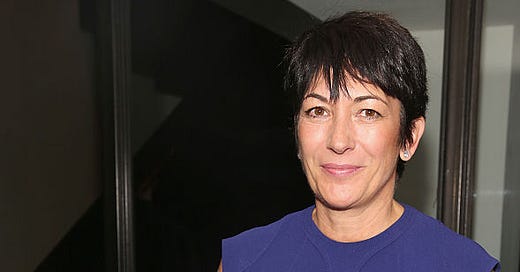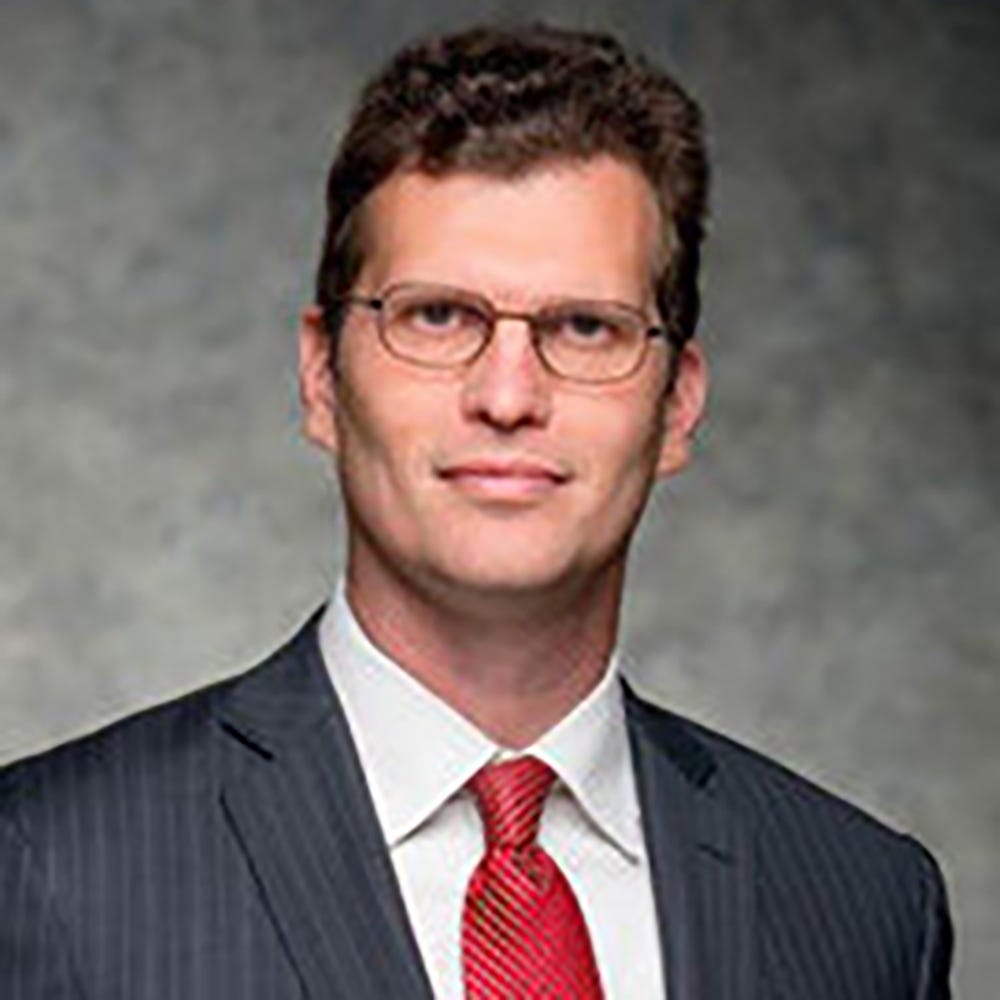The Ghislaine Maxwell Case: An Interview With Mitch Epner
Mitchell Epner, a former federal sex-crimes prosecutor, breaks down the trial so far.

Welcome to Original Jurisdiction, the latest legal publication by me, David Lat. You can learn more about Original Jurisdiction by reading its About page, you can reach me by email at davidlat@substack.com, and you can subscribe by clicking on the button below.
On Thursday, the defense will begin putting on its case in United States v. Maxwell, the sex-trafficking prosecution of socialite Ghislaine Maxwell that is now in front of a jury in federal court in Manhattan. Maxwell, a former girlfriend and close associate of the late financier Jeffrey Epstein, stands accused of helping Epstein recruit and groom four girls for sexual abuse—and, in some instances, Maxwell is accused of hands-on sexual abuse herself. Judge Alison Nathan (S.D.N.Y.) is presiding over the trial, which has gone on for two weeks so far.
This is one of the most high-profile trials in the country right now. Some of the best analysis I’ve heard of it appeared in a recent episode of Adam Klasfeld’s Objections podcast, featuring former federal sex-crimes prosecutor Mitchell Epner. (Thanks to Klasfeld and Epner, I now know how to pronounce “Ghislaine”; it’s ghee-LEHN.)
Epner, currently of counsel at Rottenberg Lipman Rich, is a friend and former colleague of mine from my days as an assistant U.S. attorney in New Jersey. After hearing him on the podcast, I reached out to him for additional insight into the trial. Here’s the transcript of our Q&A.
DL: The Maxwell prosecution is being led by three assistant U.S. attorneys from the Southern District of New York: Maurene Comey, Alison Gainfort Moe, and Alex Rossmiller. (Fun fact: Comey is the daughter of former FBI director James Comey, who served as U.S. Attorney for the S.D.N.Y. from 2002 to 2003.)
Overall, how would you rate the job that the prosecution has done in this case?
ME: Prosecutors have followed the KISS—”Keep It Simple, Stupid”—principle to a tee. They presented an easy-to-follow story of horrific abuse of four girls by Epstein, who was actively assisted by defendant Maxwell. The prosecutors presented copious corroboration. The victims’ testimony corroborates each other. They were also corroborated by contemporaneous observations of the victims with Epstein and Maxwell, albeit in non-sexual situations.
DL: What’s an example of the corroboration you’re referring to?
ME: Perhaps the most powerful corroboration came from the ex-boyfriends of two of the victims, who each testified that their then-girlfriend told them of the abuse long after the fact, but long before the Epstein Victims’ Compensation Fund was established.
DL: The trial has gone much faster than many of us expected. The prosecution previously estimated that its case could take four weeks, but last Friday, it rested after just two weeks. Any thoughts on what this means?
ME: The prosecution wanted to avoid the O.J. Simpson problem of saying that a case was simple, but taking months to make their case—which creates the indelible impression that the case is not simple. Here, the prosecutors provided (a) four victims’ testimony, (b) corroborative testimony from contemporaneous third-party witnesses to non-sexual interactions between the victims and Maxwell/Epstein, and (c) corroborative testimony from former boyfriends of two of the victims that the victims told them about the abuse by Maxwell and Epstein long before the Epstein Victims’ Compensation Fund was created.
DL: Let’s turn to the defense. Maxwell is represented by four lawyers: Jeffrey Pagliuca and Laura Menninger, two Colorado-based lawyers from the firm of Haddon, Morgan and Foreman, who have represented Maxwell in civil litigation over sex-abuse allegations; Christian Everdell, a partner in the New York office of Cohen & Gresser, and a former AUSA in the Southern District; and Bobbi Sternheim, a seasoned criminal defense lawyer in New York. How would you say Maxwell’s lawyers have performed?
ME: The defense has had some effective cross-examination. They were able to establish that the accounts of each of the victims has changed over time. The defense won a victory when the prosecutors withdrew their plan to present the brother of “Jane” [a pseudonym] to testify about prior consistent statements from Jane. This planned testimony would have further established that Jane spoke of Maxwell’s participation in the abuse long before the establishment of the Epstein Victims’ Compensation Fund. The brother was pulled as a witness after he informed prosecutors that Jane contacted him after her testimony and provided him some level of feedback about her cross-examination, in apparent violation of Judge Nathan’s order forbidding witnesses to be exposed to trial proceedings before their testimony.
DL: Any other wins by the defense?
ME: The defense also won victories when Judge Nathan informed the jurors that some of the sexual activity that allegedly took place between certain victims and Epstein/Maxwell was not illegal.
DL: What about missteps from Maxwell’s lawyers?
ME: The defense had a huge (and unnecessary) swing-and-miss when they promised in their opening that the evidence would show not only that the victims’ accounts changed over time to include Maxwell, which the defense did demonstrate, but also that money was the motivation for the victims to change their stories. The defense theory has never made sense to me. There was no logical reason why the victims would believe that they would get more money if they made allegations against Maxwell in addition to their allegations against Epstein. The defense absolutely failed to elicit any testimony or introduce any exhibit that would support this theory. I expect that the prosecutors will highlight in their closing arguments this failure by the defense to establish any basis for this major plank of the defense.
DL: One big question in high-profile criminal cases is whether the defendant will testify. The conventional wisdom is that defendants do not—and should not—testify. But in a number of high-profile criminal cases, such as the prosecutions of Kyle Rittenhouse and Elizabeth Holmes, the defendants did take the stand. Do you think Maxwell will testify—and if so, how do you think it would go?
ME: If Maxwell testifies, I expect it will not go well for her. My expectation is based on a review of her (publicly available) deposition testimony, which was combative, arrogant and evasive.1
DL: Ahead of putting on their case, Maxwell’s lawyers just submitted an unusual request: they’re asking for three of their witnesses to be allowed to testify without revealing their identities, just as three Epstein victims called by the prosecution did not have to reveal their identities. How do you think Judge Nathan will rule?
ME: As I understand it, the request is to testify under a pseudonym, with the prosecution knowing the actual identity of each witness. That request might be granted by Judge Nathan. If the request were for the prosecutors not to learn the true identity of the witness, that would never be granted.
DL: Based on the evidence as it currently stands, what do you predict in terms of the likely outcome?
ME: Unless something major changes during the defense case, I would expect convictions on one or more counts in the indictment.
DL: Any final insights about the case you’d like to share?
ME: One of the most important things about this case is the fact that it is happening. When Jeffrey Epstein died in jail, many people feared that the matter would die with him. Maxwell’s arrest has meant that there has been a public airing of some, but far from all, of the horrific abuse that Epstein inflicted on these girls.
I know that there are many people who are disappointed that the case has been so narrowly focused on the specific acts of Maxwell against these four girls, without discussion of other victims or other high-profile people who travelled on Epstein’s plane or to his island. The criminal case against Maxwell was always going to be focused on the acts alleged in the indictment against Maxwell. Broader justice and exposure would require a different forum.
DL: Indeed. Thank you, Mitch, for taking the time to share your insights into this fascinating case.
Benjamin Weiser of the New York Times interviewed several prominent defense lawyers about whether Maxwell might testify, and most agreed with Epner: it would probably not go well, so she should not take the stand.
Thanks for reading Original Jurisdiction, and thanks to my paid subscribers for making this publication possible. Subscribers get access to Judicial Notice, my time-saving, weekly roundup of the most notable news in the legal world. You can reach me by email at davidlat@substack.com with any questions or comments about Original Jurisdiction, and you can share this post or subscribe using the buttons below.




